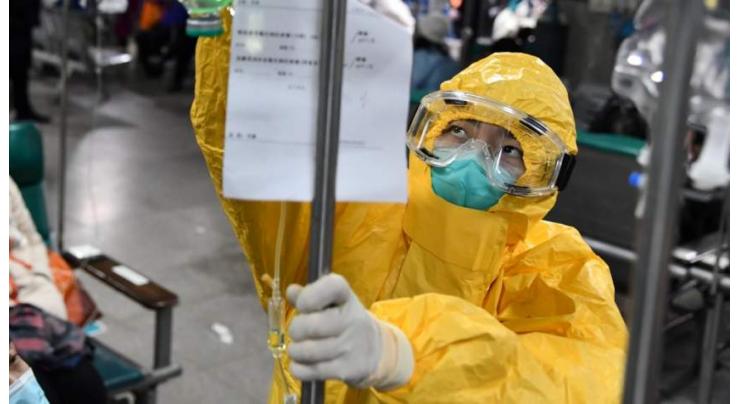
- Home
- Business
- News
- Wealthy countries should come forward to help South Asian countries combat Coronavirus: SAARC Chambe ..
Wealthy Countries Should Come Forward To Help South Asian Countries Combat Coronavirus: SAARC Chambers Of Commerce And Industry (CCI) President-designate Iftikhar Ali Mali
Umer Jamshaid Published April 04, 2020 | 04:55 PM

SAARC Chambers of Commerce and Industry (CCI) President-designate Iftikhar Ali Malik Saturday urged the leaderships of the developed countries to come forward helping the under developed South Asian countries as this region lacks sufficient resources to combat with coronavirus pandemic
ISLAMABAD, (UrduPoint / Pakistan Point News - 4th Apr, 2020 ):SAARC Chambers of Commerce and Industry (CCI) President-designate Iftikhar Ali Malik Saturday urged the leaderships of the developed countries to come forward helping the under developed South Asian countries as this region lacks sufficient resources to combat with coronavirus pandemic.
Talking to a delegation of traders here today, Iftikhar Malik said, "our greatest concern is the potential of the virus to spread to countries with weaker health systems coupled with bleak economy which are ill-prepared to deal with it," says a press release issued here.
He said although world donors have started pouring down money to South Asian countries but the fact is that despite this monetary helps, the health system in this region is obsolete and not up to the mark according to the magnitude of this pandemic.
He said in changing scenarios, the World Bank just rolled out its first wave of emergency support to fight the spread of COVID-19 in 25 countries across the globe. Of that support, more than $1.4 billion will help governments across South Asia respond to the immediate health consequences of the pandemic and protect their people.
Iftikhar Malik said in Pakistan, while focusing on the health sector, total foreign donors $200 million package will also help the poor and vulnerable cope with the immediate impact of the pandemic through social protection measures, food supplies, and virtual classes for children, so they don't stop learning during school closures.
He said if developing countries are overwhelmed by the virus, there is a threat that the disease would rage on in developing countries, even if it is brought under control in developed states, and inevitably spread back into places like North America and Europe.
"To avoid such a scenario, rich states must keep a focus on helping other countries with weak healthcare systems laced with crumbling economy despite the fact they are fighting their own battle with the disease," he added.
"The worst is yet to come. In India alone, millions of migrant workers are spilling out of cities, spiking fear they'll carry the infection back to their villages; hundreds of millions of informal workers are left without a job and are at risk of starving," he added.
However, Iftikhar Ali Malik said the COVID-19 pandemic is also an opportunity for governments in the region to strengthen health and social protection systems as over 60% of the regional population lacks access to social protection. Many live and work in unsafe conditions, placing them at higher risk of contracting a disease.
He said as it turns out, these testing times have also provided new opportunities for South Asian countries to join forces, strengthen regional institutions, and pool resources to fight a deadly pandemic that knows no borders and spreads indiscriminately through communities.
He said investment must be directed toward providing universal health coverage and a social protection floor, especially for marginalized groups. He said it also drives economic growth by building a stronger and healthier workforce. Without protection measures, the pandemic will continue to widen inequality gaps.
Iftikhar Malik said the leadership of the South Asian countries are ready to fight with equal strength to recover with better health care for the future.
Related Topics
Recent Stories

Tennis: ATP Barcelona Open results - 1st update

Swiatek's perfect 10 in Stuttgart as Vondrousova stuns Sabalenka

Arandu's roads closed due to flooding

Oil tanker catches fire in Islamabad’s Blue Area

Pakistan committed to ensure safety of foreign nationals: FO

Tennis: WTA Stuttgart results - 1st update

Four passengers injured as train hit an empty vehicle

Over- speeding bus crushed to death two bike riders

Turkey's Freedom Flotilla ready to set sail for Gaza

French teen dies from heart failure after knife attack near school

Iranians appear unfazed by Isfahan blasts

UAF celebrates Int'l Chinese Language Day
More Stories From Business
-

Pakistan aims to agree outline of new IMF loan in May - Finance Minister
7 hours ago -

FTO commends FBR's role for prompt resolution of tax payers’ issues
7 hours ago -

BISP embraces E-procurement: launches inaugural tender
9 hours ago -

Business community indebted to Ahsan Zafar for his unprecedented services: Yousuf Rajput
9 hours ago -

China auto sector steps up Europe push with Spain plant
9 hours ago -

Condolence reference held in memory of FBR's officials
10 hours ago
-

Health activists ring alarm bells over 10-stick cigarette pack
10 hours ago -

Karachi receives maiden direct flight of Azerbaijan Airlines from Baku
10 hours ago -
PSX turns bullish, gains 619 points
11 hours ago -

Rupee bounces back; gains 13 paisa against dollar
10 hours ago -

Partners join hands for alternate use of marble, granite slury
10 hours ago -
Tokyo's Nikkei index tumbles 3% in morning trade
13 hours ago















